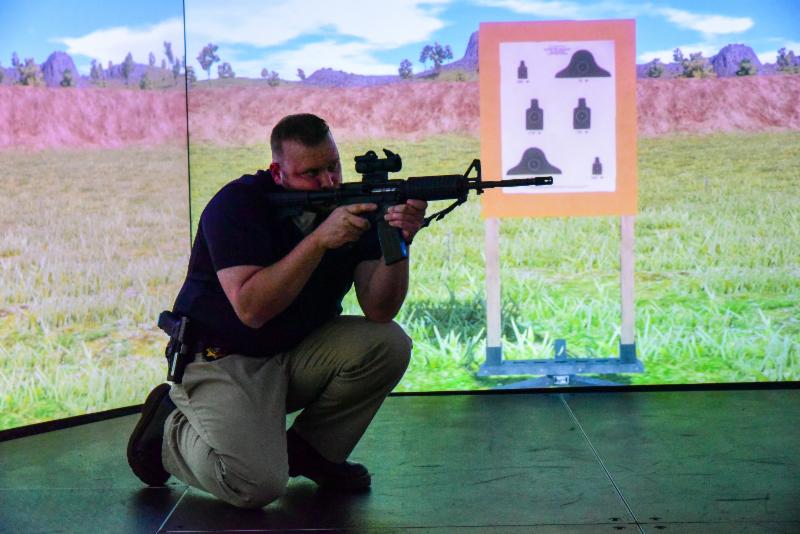
April is National Autism Awareness Month. Around this time in 2020, VirTra released the “Autism Awareness” course to help law enforcement recognize the signs of autism. This would not have been achieved without the partnership and expertise of SARRC – Southwest Autism Research & Resource Center.
Since the inception of this training program, agencies all around the country have received the coursework and scenarios. Some agencies such as Utah Attorney General’s (UAG) Office have made VirTra’s Autism Awareness training a requirement. So, what has happened with VirTra, SARRC, and the autism community since 2020?
Autism Training Program Adoption
The UAG inspired Utah agencies to adopt the Autism Awareness training program. In fact, Utah Governor Cox signed H.B. 162 (peace officer training amendments) and H.B. 334 (special needs training for law enforcement). These two bills required POST training to include 16 hours of training on autism and mental illnesses. The training programs include the use of classwork, bodycam review, and VirTra’s simulated scenarios to familiarize officers with autism spectrum disorder.
Additionally, the UAG received the Best of State award for their Virtual Reality Training Center and the lessons officers learn from it – including Autism Awareness. Sean Reyes of the UAG even received the First Annual Autism Award in 2021 for the impact they’ve made by teaching officers about autism.
Even in 2020 when the program was barely released to the public, VirTra received positive feedback from Chief Muma of Jerome Police Department in AZ. “I really thought it was well developed,” said Muma during a video interview. “It brought forth something that I don’t think we’ve had in the field… It’s provided something that has been lacking in the industry for a long time.”
SARRC’s Major Achievements
A lot has happened since SARRC was formed in 1997. What was once considered a 1 in 500 diagnosis has shifted due to further research. Now, it is reported that 1 in 36 children are diagnosed with autism. According to SARRC’s recent statistics, here is what they have provided for the autism community and their families just over the past year:
- Provided 151K clinical intervention hours with those on the autism spectrum and their families.
- Served 1.1K individuals with autism through clinical and research programs.
- Screened 251 individuals through the Diagnostics Services program.
- Educated 125 children with and without autism in SARRC’s Community School program.
VirTra values our partnership with SARRC not only because of the great assistance they have provided us in releasing our coursework to law enforcement. We also truly believe in their mission and drive to make the world a better place for those with autism spectrum disorder.
The Future of Autism Awareness
The country has made great strides in not only diagnosis, but in educating the public about the signs of autism and how to communicate with someone on the spectrum. People who are communicating with a wide variety of citizens every day – such as police officers – are especially deserving of this type of training.
In the past, there have been unfortunate instances where officers have mistaken autistic behaviors as “suspicious” or even drug-related. With the number of agencies now receiving training and the general public awareness of the disorder, we hope to see the number of these situations decrease significantly.
To learn how to obtain the Autism Awareness course, contact a VirTra specialist.
Your Virtual Reality Training Resource
Office of the Utah Attorney General
3/13/17
In this issue, Utah law enforcement leaders and trainers will discover new information about how virtual reality training and Force Science are combined to help officers prevent “choking” or physical freeze at a critical moment of performance. You will learn about the benefits of inviting local community leaders to experience first-hand an officer involved critical incident on the VirTra® virtual reality simulator. We invite agency trainers to schedule the virtual reality range to improve shooting skills from basic marksmanship to technical long gun shots.
We are grateful to the Legislature, Governor’s Office, and many other public safety partners for making the VirTra simulator available to Utah’s Law Enforcement Community. To schedule a demonstrations for community leaders or agency training session call Will Fowlke or Scott Carver at 801-281-1200.
This Is Your Brain. This Is Your Brain On VirTra
By Ken Wallentine

Michelle Kwan, 2002 Olympics, fell on the triple jump.
Greg Norman, 1996 Masters, lost his lead and handed the Masters to Nick Faldo.
Dan O’Brien, 1992 Olympic trials, shockingly missed—entirely missed—three pole vault attempts.
Read More About Preventing Cops From Choking Under Pressure
Three Critical Reasons For Law Enforcement To Educate Community Leaders
By Will Fowlke
Chiefs and sheriffs have asked the Attorney General’s VirTra Training Center to host community leaders such as mayors, city council members, county commissioners, prosecutors, and legislators to a virtual reality simulator experience.
Read More About How Community Leaders Benefit From a VirTra Experience
Law Enforcement Virtual Reality Range Days
By Chris Walden

Since launching the VirTra program at the Utah Attorney General’s Office, I‘ve observed many agencies participate in the training. I haven’t met a trainee that didn’t enjoy the experience to some degree. The department trainers who debrief the training tell us they find value in the virtual reality scenarios that their officers experienced. Do you know that we have simulated handgun and rifle ranges available on the VirTra simulator?
Learn More About Virtual Ranges And Open Range Days
Endorsements: Simulation Training
“I can’t encourage officers enough to attend VirTra training. It is absolutely critical… It will change the way you think. It will change the way you act and it can help save your life and the lives of others.”
Heather White, Attorney Defending Government Entities
VirTra In The News
Simulating Deadly Situations For Police
Virtual technology helps officers train for real-life situations
Watch Video: Introduction to VirTra Training
Watch this short fast paced video introducing you to the cutting edge high tech virtual reality training experience for your officers.
Learn More About
The Office Of The Attorney General
To schedule a virtual reality training session call
Will Fowlke or Scott Carver
801-281-1200
MURRAY, Utah — Police officers are constantly undergoing training on how to handle stressful situations they encounter in the field.
On Tuesday, Utah police officers stepped into a virtual reality simulator, giving them an enhanced training experience.
The training was put on by the Utah Attorney Generals’ Office at a facility in Murray. The simulator, VirTra system, is a 300-degrees virtual reality.
It allows an officer to see, hear and feel the experience that is put before them.
The VirTra is about a quarter-of-a-million-dollar system that trains officers on how to de-escalate a dangerous situation to the best of their ability.
“What we are really doing here is overlaying training with stress inoculation,” said Ken Wallentine, Attorney General Special Agent VirTra Operating Director. “They (the officers) can make high stress mistakes and learn from them as opposed to high stress mistakes in the public where perhaps someone else pays the price.”
The system’s super computer is designed to respond based on the the officer’s actions. There are hundreds of video scenario responses created and built to react to their actions.
“The actors respond to the officer’s tone of voice, whether the officer chooses his first response to take a weapon out to fire, so they are inside technically sophisticated video streaming around them,” Wallentine said.
VirTra’s goal is creating critical decisions for officers, solving crisis communications with high-stress levels that physically raise your heart rate so an officer comes out armed with new tools to bring into the field.
The program in Utah has been so successful they are sharing it with other states, including an Arizona agency next month.








